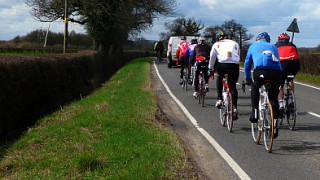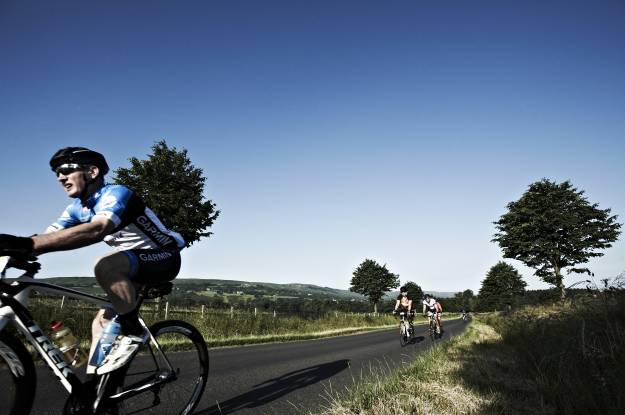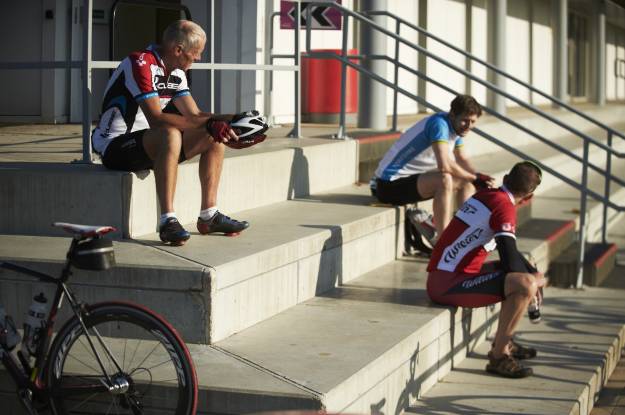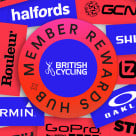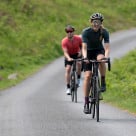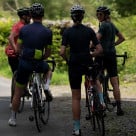"I’m not a ‘caretaker’ – I can’t just step into a job and do it like everyone else has done it." British Cycling talks to Geoff Saxon, founder and co-director of successful sportive brand Kilo To Go, about how he got started, his plans for 2012 and his take on the future of sportive events.
EA: You must be busy at this time of year with preparations for the forthcoming season?
GS: Yeah. Yesterday for example. Yesterday wasn’t a typical day, it was an extreme day. I was up before 5am for a meeting down in Cornwall with the Council. Got there about 10:00. The theory was that I’d leave after lunch and get back about six. But I got tied up with other things and went to a few bike shops that are involved [with the Cornwall Tor] and got back about 10:30pm! That’s an extreme day, but they’re not all like that.
EA: How long have you been in the business of event delivery and how did you get into it?
GS: In 2006 I came to a point in my career when I didn’t want to do what I was doing any more and I was in a lucky position where I could take the time off and do something a little more enjoyable. I got to the situation where I thought, ‘Why not do something in an environment that I really love. I’ve always cycled, I’ve always been a cyclist since I was a schoolboy. I did my first races as a schoolboy back in the days of the BCF and as a junior and I just loved it. So I thought, ‘Well I’ll do something in cycling, cos it’s great’. So at that time I looked at what was going on and I thought that there’s a lot of these sportives, these mass rides coming into the frame in this country.
At that time the whole sportive thing was quite new. I looked at things like the Fred Whitton, the Spud Riley and the Polka Dot Challenge – all upcoming new sportives and I thought, ‘I reckon this is going to be really popular’. So I thought ‘I can organise.’ When I was relatively young, as a twenty year old, I was organising time trials because no-one in my club would do it. So I organised a few time trials and club road races – the Essex League and Essex Division Championships.
Fast forward the clock to 2006 I thought, ‘Well, I can organise events, I know I can do it so why not organise some of these big sportive events and get people out on their bikes?’ So I started planning that in 2006 and in 2007 I had 12 events – wham-bam – no one had done that before! 12 events up and down the country – pick a brand name, I went with ‘Kilo to go’ and launch it. A few people looked at that and thought, ‘Wow, that’s interesting...’
EA: To hit the ground with 12 events in your first year was a really ambitious target wasn’t it?
GS: I’m not a ‘caretaker’ – I can’t just step into a job and do it like everyone else has done it. I always want to be the first one in and do it a bit different. I wanted to demonstrate that there are other places in the country that aren’t the Lake District or the Peak District so I tried to put sportives into places where there wasn’t an established sportive. I wanted to show people that it can be done. In a sense the geography doesn’t matter in terms of delivering an event. I can go out there with my team and we can put an event on anywhere in the UK.
EA: I suppose it was the first time in the UK when there was a sportive series that people could have a tilt at, where they knew what to expect when they turned up to the event.
GS: Yeah I think that was something that was definitely on our agenda to achieve. While every event will be different because it’s in a different part of the country, you know that we’re going to turn up, you know that we’re not going to run off with your money (laughs), the event is on an inspiring, interesting, well put together route. In the first year I ended up going out and riding all the routes in advance of the events because I didn’t want to do it all from a map. So I could say, yep, I know how tough or easy this route is and I had a standard approach across all the events.
EA: What would you say is the biggest challenging in delivering a big event?
GS: As soon as you step over that 1000 rider threshold, as a responsible organiser, you’re looking at crowd management and public order. A couple of our events are over 1000 riders but of course the Cheshire Cat is over 3000. It’s like stepping out of small club events through this gateway and suddenly it’s quite different how you have to organise it.
EA: The sportive market has grown massively since you started back in 2007 – how do you see it developing?
GS: I think that the great attraction of sportives is that they’re simple – for a participant the experience of an organised ride, the entry process, the bureaucracy is minimal. That’s great cos it’s easy to get people out on their bikes. But I do fear that these days with poor infrastructure and poor roads we need to do something to regulate sportives. There’s no better organisation to do that than British Cycling. The real challenge for organisers is how to organise a quality event without adding bureaucracy, process and expense because that will end up being passed on to the rider in one form or another. That’s the challenge.
EA: Any news on the 2012 events?
GS: The six main events that we ran under our Kilo to Go brand last year - all of those take place in Spring, between March and June. In the second half of the year, from late summer to autumn, we’ve got some brand new events that we’ve not launched yet. They’ll be going online very soon. They’re in new areas that we’ve not had sportives in before. You’ll have to be a bit patient on those...
The Rideouts – we do those free of charge. It’s a way of putting something back into cycling. They’ve been very popular and the fact that our sponsors have supplied some free goodies to give away – people are overwhelmed by it. We do three flavours of Rideout – a Reliability ride, a Club ride, (emulating a club run) and a Beginners ride, which is an opportunity for beginners to ride in a group and gain confidence in a semi-formal environment. A full-on sportive might be too much for them but this is a good half measure and very popular for that reason.
EA: Over the last six years is there one memorable moment that makes all the hard work worthwhile?
GS: There are so many really but I suppose when some riders cross the line – the look of elation on their faces, the look of achievement puts a bit of a lump in my throat. To see people literally in tears put it into perspective for me. There’s me, looking at numbers, volumes and lists of people you can get a bit detached from it all. What put’s it back in perspective are those moments when you’re on the finishing line and a bloke gets a hug from another bloke or his wife! You hear people saying, ‘It’s my first 100 hundred miles, it’s fantastic’, that kind of banter. When you see that it makes it all worthwhile but for me, personally, it reminds me that this is about people, about riding your bike, about enjoying it. When you see that it reminds you what you’re doing it for really.
EA: What has British Cycling done to help you deliver your events?
GS: We wouldn’t dream of running an event without third party public liability insurance. We use British Cycling’s insurance for a number of reasons. I believe it’s the best out there by far. There are other providers out there but we want the best product to meet our needs. But there’s all the other stuff which is actually just as important – It’s important for us to be seen to be associating with brands we want to be like. It’s nice to be able to say we work alongside or we run under the auspices of British Cycling. We’re happy to put your logo on our events. The whole British Cycling thing is cool and it’s cool to be associated with it. British Cycling is working for mass participation cycling, it’s got an entry system for organisers, it’s got a very active online presence publicising and promoting and coordinating events. You communicate stuff out for us, which is valuable and important. British Cycling is in contact with a large population that we tap into and I think the most important thing is the profile and credibility of British Cycling. It’s a successful, reputable governing body that doesn’t screw up or do anything bad - and that’s the sort of business that we want to be. We want some of your magic to rub off on us.
For more information on Kilo to Go and their events go here: www.kilotogo.com

